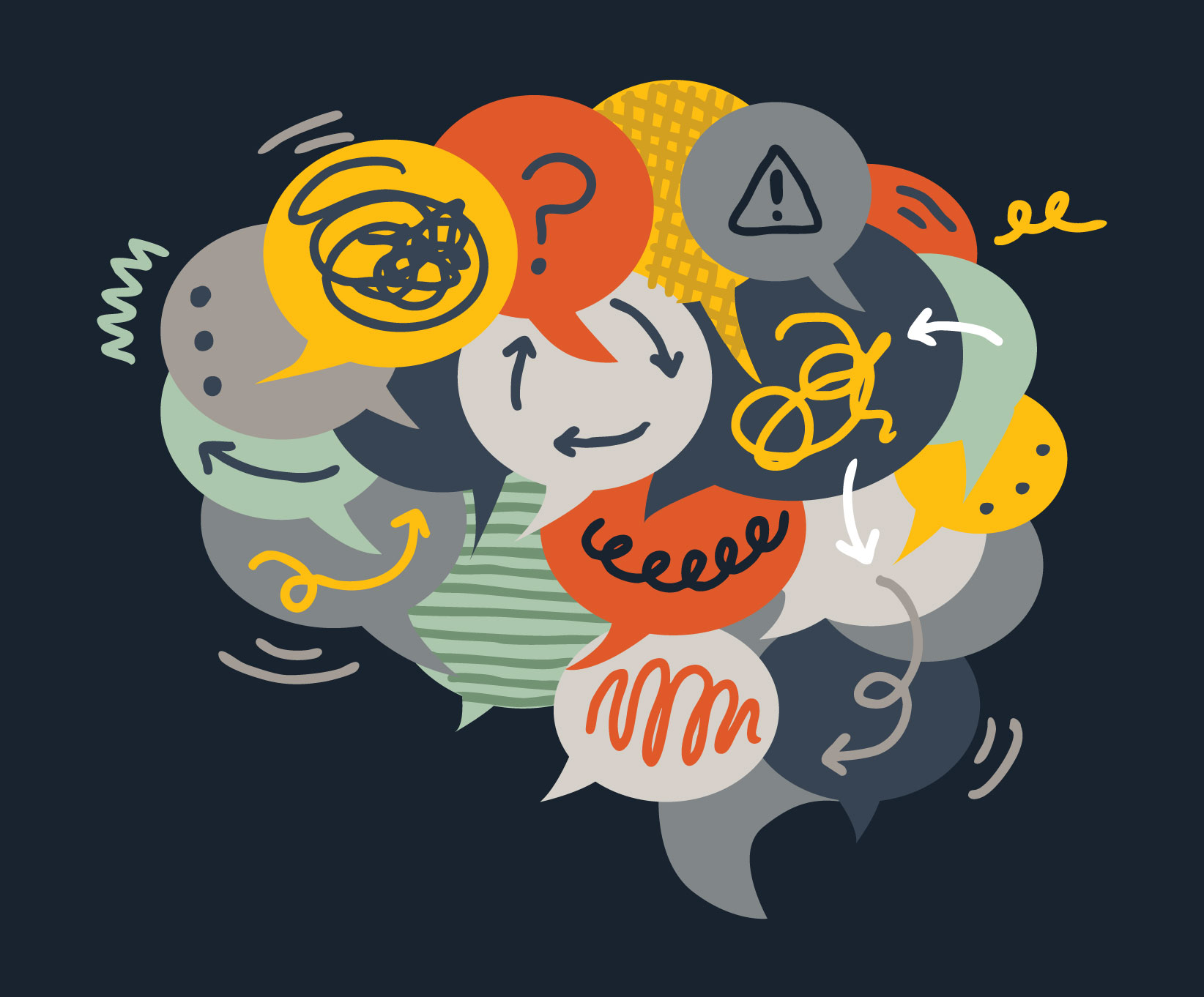
Is there a weed in your brain that you just can’t pluck out?
You know, a persistent problem, that nagging thought, the idea that’s taken root in your mind and won’t let go. It is the kind of problem that wakes you up in the middle of the night, and distracts your brain when you should be spending time with friends and family. The kind of problem that has you reaching for your phone at midnight to quickly jot down a few notes for an idea that just popped into your head.
If you don’t have any idea what I’m talking about, then congratulations! Seriously. You can close this post now and move on with your life. For others, who are feeling a little bit uncomfortable right now, I suggest you stick around and embrace the discomfort for a little bit.
If you’re still with me, then it sounds like you’re the type of person who needs to see things in a better place, who keeps turning problems over and over until you dig up answers, and who lets them occupy far too much space in your brain than is healthy. Maybe this all works for you, but if you’re anything like me, obsessing over these ideas can be intensely counterproductive. Because not only will they distract, but different problems and competing ideas can collide and compete for your attention, leaving you feeling overwhelmed and ‘mired’.
Now, I’m not claiming that I have all of the answers, but I’ve learned over a few decades to live with a brain that tends to obsess over these things. If you don’t find a way to control them, they end up controlling you. And so coming up with a few strategies to manage them will let you live your life, and make progress.
So, what can you do to start tending these mental weeds effectively? Here are some strategies that have helped me find a better balance.
Embrace It
I found that along with the obsession comes a certain amount of guilt. But you know what, I am who I am, so why not just embrace it? I tried to fight it for a long time, but at some point I just had to accept it. I realized that I absolutely loved solving problems, and so it was natural that my brain would latch onto things. Once I embraced this, instead of feeling guilty and frustrated, it had an enormous impact on my outlook. No longer did I feel an intense stress around the behaviors I saw in myself, instead it became a game of figuring out how to embrace and guide those behaviors. I started to see my brain’s tendency not as a flaw, but as a force that just needed some guidance.
Write It Down
I know this sounds silly, but get it out of your brain! It took me an embarrassingly long amount of time to realize that a big part of the reason that these problems would constantly pop into my head was because my brain was subconsciously worried about losing track of them. Bringing them up over and over was my brain’s way of holding onto them.
Consciously, I thought that letting them percolate in my brain would be helpful, since writing down an incomplete idea could be seen as anchoring, or a premature optimization. But that just isn’t reality. The reality is that by jotting them down, as well as their context, it freed up my brain to make progress and move these things forward. They would still pop into my head from time to time, but with less frequency and anxiety.
I’ve found this practice to be particularly helpful right before the weekend or a vacation, when you’d like to offload as much as possible. On Friday afternoon, try to capture as much as you can out of your brain, I bet it’ll do wonders for you. Recently I’ve started using a Figjam board to help capture ideas, but a simple notebook, a Trello board, a notes app on your phone, or a document works just as well. The jury is still out on its effectiveness and longevity for me, but for now I’m really enjoying the free flowing nature and organization of it.
Distract Yourself
Staying focused on a single problem can lead to either getting stuck, or to a myopic view of that problem. But if your brain tends to latch onto ideas, that can be a challenge. And just trying to not think about the problem definitely doesn’t work. So my go-to is to grab an audiobook to fill some of the space in my brain. Introducing a lower-stakes, or completely different problem into my brain can help to shift it away from the problem you’re obsessing over.
If you’re like me, and in particular you find that your brain decides to obsess over things as you’re trying to fall asleep, this can be a game changer. I’ve found that listening to an audiobook as I fall asleep grabs enough of my attention to keep my brain from wandering, but not enough to keep me from falling asleep (unless the book is REALLY good!).
Talk it Out
This requires the cooperation of another person, which makes this strategy a little more challenging, but if you can find that person this will represent another huge shift for you. I used to think that in order for me to talk through my problem with someone else, they had to also be well steeped in that problem. But honestly, that couldn’t be further from the truth! In fact, the more I’ve done this, the more I’ve realized that the less they understand the better. Talking to someone well outside of your problem will lead to questions and feedback that are completely outside of your current thinking. It will lead to questioning assumptions that you didn’t even know you were making.
But more importantly, there is something about putting your ideas out into the world, the very act of verbalizing them, that lets your brain calm down. It forces you to structure your thoughts and often reveals clarity simply by hearing yourself say it.
I have a number of people in my life who are willing to listen to me ramble and rant about whatever I’m currently obsessing over, and more often than not can either let me know that the problem is not as big as I’m making it out to be, or has a thought on it that shifts my perspective in a significant way. Find those people, and rant and rave away. Your brain will thank you.
Into the Wild
I’m firmly convinced that the primitive parts of our brain, while we often try to suppress them as much as possible, are the secret to wrangling the conscious part of our brain. When I find myself feeling overwhelmed by the challenges in front of me, I try to get into nature. That can be as simple as staring at the stars from my backyard, visiting a park, or taking a walk in the woods. Somewhere that the screens and distractions and noises that dominate our modern lives can fade away.
There is something about the sights and sounds of the woods, a creek, the ocean, the mountains, or a campfire that tickle the primitive part of your brain and shift it into a lower gear in a way that nothing else can. This shift helps quiet the buzzing conscious mind where the persistent problems often reside, offering a new perspective and reducing the mental clutter.
Short periods of time in these environments can help, but if you can get out into them for a few days, it’ll change your existence. Maybe it won’t work for you, but I hope it does, because nature has a way of soothing my brain in a way that is indescribable.
Just Get Going
Over the years I’ve discovered that sometimes the reason I would obsess over a problem was because I wasn’t making progress against it. Lack of progress caused paranoia and worry, which pushed it to the front of my brain. But I’ve found that making some progress, any progress, can trick my brain into letting go of a problem for a bit.
The reality is though that making progress can sometimes be the hardest part. When I feel particularly paralyzed, I’ll block off time and say to myself, “I’m not going to work on anything but this for the next 5 minutes.” Applying 5 minutes towards anything is easy. But 9 times out of 10, that 5 minutes was enough to jumpstart me, and that 5 minutes would turn into a much larger chunk of time. At least until my next meeting got in my way!
Beyond managing the weeds that are already there, another powerful strategy is to simply prevent new ones from taking root in the first place.
Celebrate “No”
In the software world there is a saying I love: “the best code is no code at all”. Anything you create has to be maintained, it’ll eat up time and energy, and ends up being a burden. So you have to carefully weigh the value of everything you create. As you probably thought reading that, this is applicable to far more than just code, and especially applicable to keeping your mental space clear.
People are going to ask you to do things constantly. You can’t say yes to everything. The more things you say yes to, the busier you become (duh). But what you don’t realize is that all of these things you say yes to have second order effects and dependencies. The more things on your plate the less effective you’ll be across the board, the more distracted you’ll be, the more cluttered you’ll feel. Everything will suffer.
Celebrate saying “no” to things. Not out loud, and not publicly, that would be super weird. But to yourself, celebrate keeping your commitments low. You’re not rejecting people, you’re keeping your schedule free to be able to focus on the things that are really important.
Saying no can be really challenging, so instead practice telling people “I’d really love to help, but my schedule is so full right now that I wouldn’t be able to give this my attention right now.” It has the benefit of both being true, and feeling better than just outright rejection.
Find What Works for You
These are some of the things that have helped me find my own balance, but believe me, I don’t have it all figured out. I still let the problems I’m thinking about occupy far too many of the cycles in my brain. My wife often calls me out for glancing at my phone far too much, and it is usually because I’m thinking about a message that I’m expecting, or I’m obsessively rereading something I’m writing.
Over the years though, I think I’ve found a way to treat my work life as the marathon that it is, rather than treating every day as a sprint. It’s an ongoing practice, but the journey is about finding your tools to take back control from the mental weeds. My hope is that by sharing these strategies, you’ll feel empowered to experiment and find your own ways to tend to your mental garden. Pick one strategy that resonates with you and give it a try this week. Start small, build the habit, and feel the difference as you become the deliberate gardener of your own mind, making space for what truly matters. Your brain will thank you.
Loved the article? Hated it? Didn’t even read it?
We’d love to hear from you.



